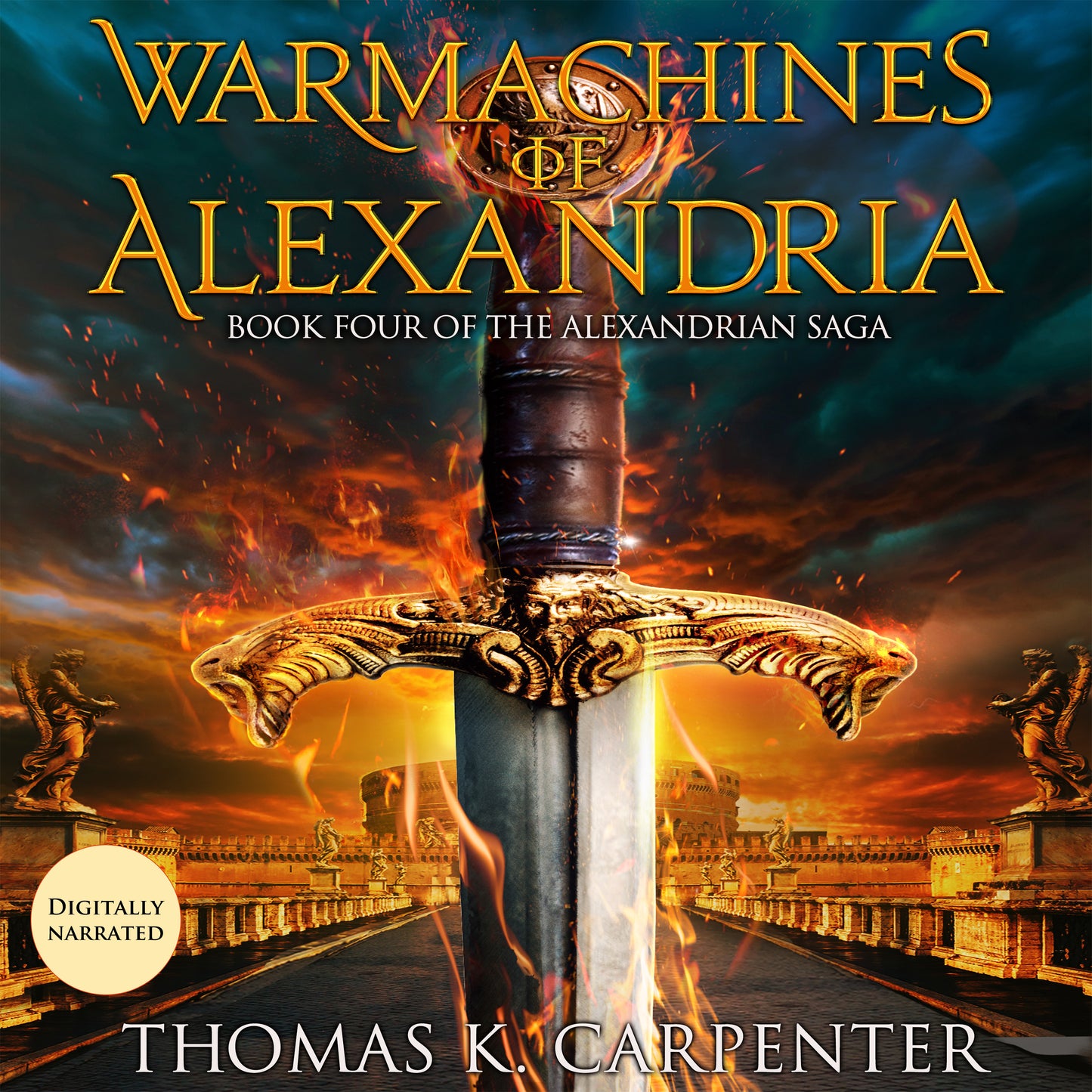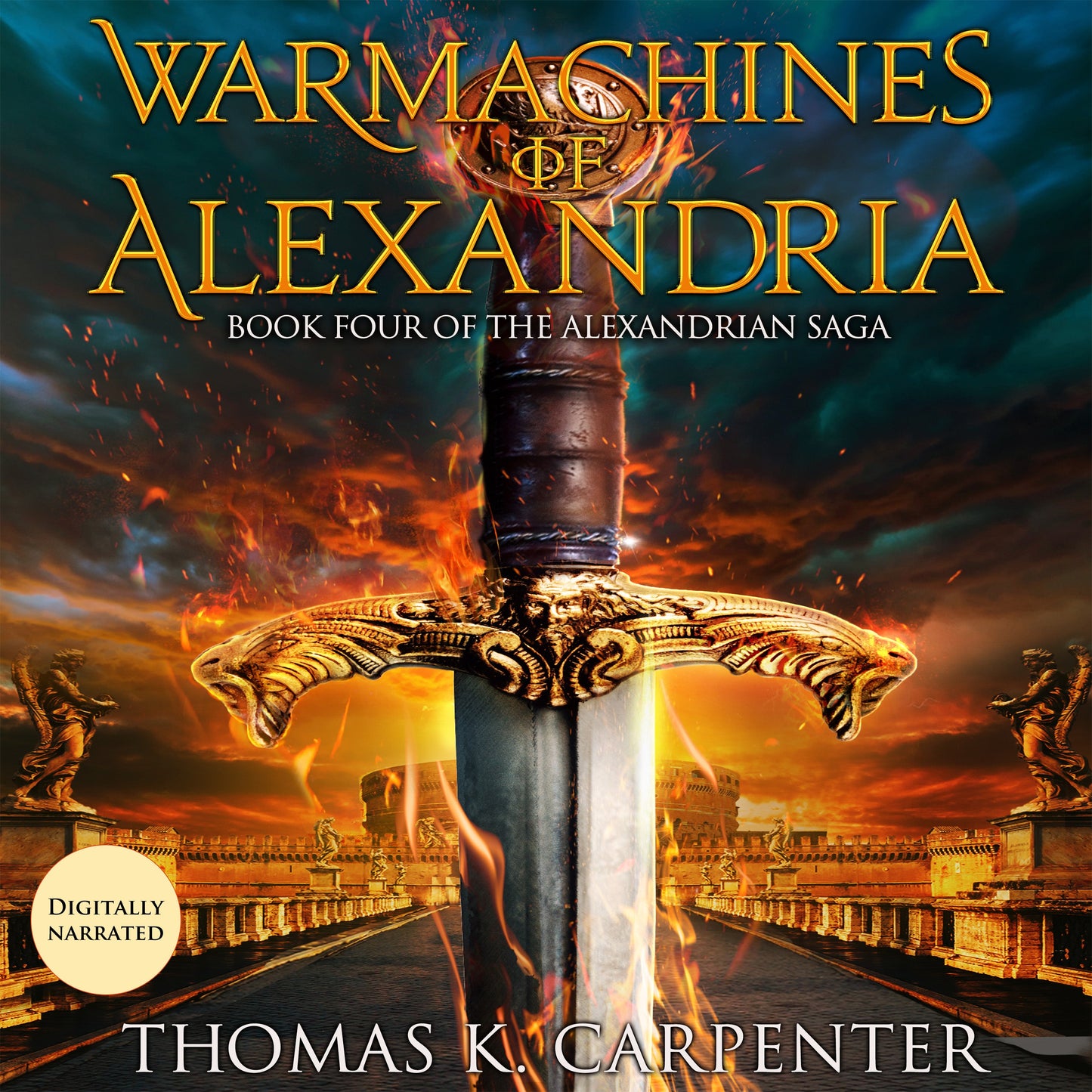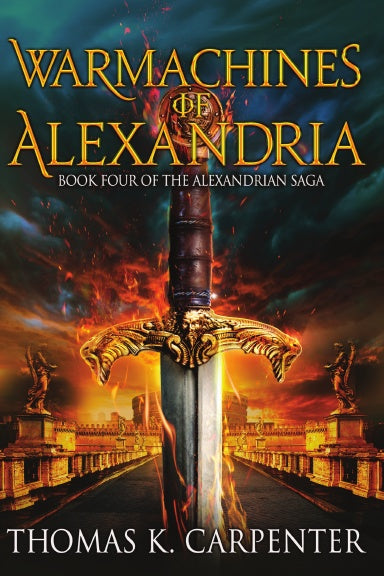BookFunnel
Warmachines of Alexandria
Warmachines of Alexandria
Couldn't load pickup availability
- Purchase the eBook instantly
- Receive Download Link via Email
- Send to Preferred E-Reader and Enjoy!
Main Tropes
- Alternative History
- Epic Storytelling
- Clash of Empires
Synopsis
Synopsis
Two hundred years before the Alexandrian revolution, the inventor Archimedes created unimaginable weapons to defend the city-state of Syracuse from Rome. Now, the Alexandrians must contend with an enraged Roman Empire intent on destroying the technologically advanced upstart. While Agog takes his army of steam chariots north, Heron must investigate rumors of ancient weapons thought too destructive for the battlefield. As they speed towards conflict with the undefeated Roman Legion, the Alexandrian side must make a demanding sacrifice to survive.
Intro Into Chapter One
Intro Into Chapter One
Chapter One
The domes were the color of bright blood, a wound on the city of Rome, the seat of the Roman Empire. The marble buildings woke to shadow, oil lamps flickering like weary eyes, as sunrise sprayed its color across the city.
Sunrise. To its citizens, the faded pinks of the cloudscape like blood mixed with spit were the markers of a new day. For Magnus Julius Severus, the Consul of the Roman Army, he feared they were the colors of sunset, the ending of the Empire.
Standing on the high balcony, his calloused hands gripping the smooth railing, Magnus felt the throbbing heartbeat of the Legion. With his eyes closed, the beat came - one, and two, and three, and - matching the cadence in his chest.
Two new legions practiced their tactics on the wide fields of Circus Maximus. Their lock-step marching reverberated through the earth, a steady beat that musicians could play to. A thousand-throated war cry carried over Palatine Hill and set the carrion birds to flight from the square below.
The Senate had been furious at his appropriation of Circus Maximus. They had games planned, celebrations to attend. Only the seal of Emperor Claudius kept them from overrunning his office with demands.
Magnus turned his ear toward the distance, but all he could hear was the squeaking of cages, set to rocking by the flight of birds, and the delirious mumbling of dying men. He tried his best to ignore them, as he had more important things to consider, like the training of the new legions. The men in the cages were a sentence he did not care to pass yet.
One, and two, and three, and—the relentless beat was a salve to his frustration. The thudding resounded keenly in his right knee where the warhammer had smashed it when he received his Battlement Crown. He'd been first over the wall in Antioch when he was a young, vain man. That was the last time he ever envisioned himself as the second coming of Alexander. Studying his strategy and tactics was enough.
"Quad!"
The voice of five-thousand soldiers sent chills into his spine. The tempo increased as troops shifted into square formations. Ten-thousand boots ripping at the soil with hobnail soles. It sounded like distant, steady thunder.
When five-thousand shields slammed together, a bolt of steel lightning that ended the thunder, Magnus allowed himself a faint grin. He let the breath out that he hadn't realized he'd been holding.
Turning, he opened his eyes just in time to see Praetor Scipio approaching.
"I think the new legions are ready," said Magnus.
Scipio saluted and handed over the scroll tucked neatly under his arm. The Praetor was a dour, overly-serious man, but Magnus had never met a better military organizer. The Legion was only as good as the supporting auxiliaries and supply trains, and his Roman soldiers were never left wanting.
"Ave, Consul," said Scipio, standing at attention. "How can you know when you have not seen them?"
Magnus frowned at the stiff pose of his second. Discipline was the backbone of the Legion, but rigidity also led to brittleness, which in his eyes, had led to the loss of Alexandria. It seemed no accident that the Praetor's name meant 'rod'.
"Stand down," said Magnus. "A muscle must first relax before it can clench with power. Real strength comes with flexibility." He looked to the cages filled with prisoners in the square. The carrion birds had returned and he caught the scent of rotting flesh on the wind. "And I know the legions are ready because they are like blood through my veins. When I close my eyes, I feel their heartbeats, not mine. I breathe their breath, taste their sweat, bleed with them."
Scipio shifted uncomfortably and Magnus had to turn away to smile. To his second, the army was ledgers and numbers, marks on a papyrus. He received his orders and performed them, regardless of the consequences.
"The scroll, Consul," said Scipio. "The barbarian prisoners, the ones alive anyway, need decisions."
"Not yet," said Magnus. "What about the other legions in training?"
Again, Scipio shifted uncomfortably. "The Senate won't agree to the doubling of signup bonuses. We're still three cohorts away from a full legion."
Magnus slapped the scroll against his palm. "Not even one? The army needs forty legions if we're going to fight two wars and keep the borders safe from marauding barbarians."
"But you broke the Britons in months when the Legates said it would take years," said Scipio with a fair amount of adulation.
"My victory paid a heavy, but necessary, price and Caratacus still lives. You can be sure he'll rally the resistance and attempt to take back the island as soon as I move even one legion from Briton," said Magnus. "Until we can get our soldiers south to the field, our advantages are the alliance with Parthia, and Archimedes' gifts."
The upper lip of the Praetor twitched and Magnus glanced away from the balcony where the colors of sunrise had faded and the domes of the capitol had turned bone white. In the distance, the shouts of soldiers in training punctuated the morning air.
"Out with it, Scipio, I've told you before not to censor your opinions," said Magnus.
Scipio blinked and tightened his chest. "I'm not even a tenth of the strategist you are, Consul. It's the opinion of the Legates that you are the finest Roman military mind since Caesar."
"Everyone always wants to claim Caesar's mantle, just like they do with Alexander. I'm neither of those men," said Magnus simply. "Therefore, I need the advice of seasoned soldiers like yourself. So if you have an opinion, give it now, or learn to lie better."
"Yes, Consul," said Scipio nodding. "I was thinking the alliance with the Parthians improved with the deaths of the old king and the older prince. The younger brother is neither too cautious like his father, nor too bold like his brother."
"Good, good, you're not too lost in your ledgers for real analysis," said Magnus. "The assessment is correct, but what would you do with their army?"
The compliment seemed to knock Scipio back a bit, but he recovered and continued, "I would...ahem, the proper course would be to wait for the legions and march down en masse to siege the city together. We outnumber them ten to one and the Legion is the finest fighting force in the world. This is what the Legates expect us to do. It's the safest way to victory."
Magnus shook his head and wandered back to the balcony, tapping the scroll against his palm. The opinion of the Legates worried him most. Praetor Scipio had no designs on a Consul position, but the Legates, they were the future Consuls and they thought of war as only a way to gain glory and power in Rome. Victory was assumed.
A couple of the big, black birds began scraping and cawing, distracting him from his thoughts. Their wings spread like angels of death as they fought over a dead body in a cage. Magnus ground his teeth. The men in the cages vexed him, both the living and the dead. Especially their leader, the one captured from the iron boat. A boat made of iron. Magnus sorely wished they could have towed it back so he could see it with his own eyes.
"Have I said something wrong, Consul?" asked Scipio, who had nervously returned to his attention pose.
"Hmm? Yes and no. Based on the Empire's teachings on the arts of war, your assessment is correct. That is the safest way to victory."
Magnus paused, even with his political stature, he wasn't sure he should be saying what he was going to say, especially when the Praetor was beholden to the Senate.
"But I've found the safest way is often the wrong way," said Magnus.
Scipio furrowed his brow. "What do you mean, Consul?"
"The safest way is the easiest for our enemies to figure out and find a counter," said Magnus. "By taking the easy route, we signal our strategy."
"But how can they counter our superior numbers and soldiers?" asked Scipio.
"I don't know," said Magnus, "but ask Consul Aulus if he'd like to rethink his strategy now."
"But Consul Aulus is...well, the Senate passed a measure absolving him of the loss of the navy. Consul Aulus was a great admiral, his strategies and discipline were widely admired."
Magnus poured himself a goblet of water and took a long drink. He would drink no wine until the war with Alexandria was over.
"If that's what the Senate thinks passes for real legislation, they are sorely tempting the gods," said Magnus. "But despite his failure, Aulus was a good man. He had an exceptional naval mind and that's what worries me. He outnumbered the Alexandrians ten to one, just like we do. But they were able to counter that advantage through clever use of superior technology," said Magnus. "And that was before they started using the iron boats. I shudder to meet a navy full of them on the high seas. Only Archimedes' secret war technology allowed us to take these prisoners."
He gestured to the square with the scroll. The flapping of wings was unsettling. Magnus could tell the living prisoners by the absence of the big carrion birds.
"Consul, that gift, you call it, from Archimedes. It worries me and the Legates do not speak highly of it. Too unpredictable," said Scipio. "Some call it sorcery."
"I don't care what you call it, as long as it works." Magnus felt his voice rise and took another drink. The traditions and superstitions of the Empire would be its downfall. "And I don't understand them. They want this—" Magnus slapped the scroll against his hand, "—but hesitate when they are presented with something new. Don't they know Archimedes' ingenuity held the Roman army in check for three years during the siege of Syracuse?"
Scipio cleared his throat. "Maybe the other secret warmachines of Archimedes will be more amiable to the Legates."
"You have to find them first," said Magnus.
"Our man in Alexandria says he can find them, once he gets his hands on the right documents," said Scipio.
Magnus sighed. Relying on spies and assassins to win the war was the Senate's game. It'd done nothing so far.
"Consul, may I ask how you plan to attack Alexandria if waiting for the additional legions is the wrong strategy?" asked Scipio.
Magnus leaned on the railing. Stringy, white clouds stretched across the sky. Sunlight fell upon his face. It was a pleasant spring day in Rome, too pleasant for his taste.
"Never allow your enemies to know where you'll attack next, Praetor Scipio. Always keep them guessing, keep them off guard. Turn their strengths to weaknesses, their weaknesses to devastating failures. Let them believe they have every advantage, and then demoralize them."
His heartbeat thundered in his ears. He could almost taste the blood, hear the crying of the wounded on the battlefield. There would be no second chance. The fate of the Roman Empire depended on him destroying the Alexandrian upstart. Even its defiance could bring other challengers. He had to wipe out the barbarian and his allies, once and for all.
"We only have one legion in the field near Damascus, rallying with the Parthians, and the Alexandrians know the rest of our legions cannot get south until the fall. While they prepare for siege, they believe we will not attack with the full might of our army for many months," explained Magnus as he gripped the railing until his knuckles cracked.
"But while they prepare for a long siege, we will learn from their tactics, and rush down a force of our cavalry, the Parthian cataphracts, and our few steam chariots, and attack them before they are ready. Using the chariots and Archimedes' gift, we will take the city with one quick strike."
"A risky maneuver," said Scipio. "What happens if the sneak attack fails?"
"The best strategies reward failure," said Magnus, turning toward his Praetor. He knew every word he said would get back to the Senate and the Legates, but they would have to find out eventually. "With our cavalry and chariots spent, the barbarian will believe us desperate, and wish to counterattack. They know we're still fighting a war in Briton."
"How can you know this?" asked Scipio.
"I don't," said Magnus, "but it's what I would do. And this barbarian they call Agog, or Wodanaz, is no stranger to war. He waged an impressive campaign against the Germanic tribes some years ago. We let him do our job for us until the tribes offered fealty and we put an end to his little war. But he got his revenge in the end by taking Claudius' prized jewel, so I think he's willing to take risks. Like Alexander against Darius, a major victory on the battlefield brings rewards of more allies."
Scipio seemed to be deep in thought until he asked, "Where will he attack?"
"The better question is where do we want him to attack," said Magnus, "and I have a place in mind that will nullify the advantages of his steam chariots."
"And you can steer him there?" asked Scipio.
Magnus rubbed his chin. "Only if I'm good."
Scipio saluted. "Shall I assemble the Legates then to lay out the strategy?"
"The Legates? No need, the orders for the sneak attack went out weeks ago. I'm expecting them to reach Alexandria any day. Who knows, maybe in a few weeks, the war will be over," said Magnus as he slipped his finger beneath the wax seal on the papyrus.
"Sent weeks ago?" Scipio's normally stoic face broke with concern. "But the Senate hasn't approved this strategy, nor the Legates. We haven't even finished torturing the prisoners for information."
"Yes," said Magnus, looking at the scroll in his hand. "We haven't. And I'd like to keep it that way."
"But they could have important information," said Scipio.
"If they talk, which I doubt they will, since they haven't so far, the only thing they'll tell us is what we already know," said Magnus, with his thumb under the seal. The waxy button flexed and cracked.
"No." He shook his head. "Send this back. I will not dishonor them."
Praetor Scipio took the scroll, saluted, and stiffly marched from the room, leaving Magnus to his thoughts. There would be consequences for his defiance, and the employ of his strategy without approval, but he didn't care. Magnus leaned against the rail, letting his leg hang slack, so the knee didn't ache.
No. He would not torture them. Kill them because they were his enemy on the field of battle, or as their executioner, that was the unspoken agreement of war, but he wanted no part of what the Senate wanted.
Magnus closed his eyes and inhaled deeply. He did not smell the rotting of dead men below. Nor did he hear the coarse shouts of soldiers in training. Or feel the slight breeze on his face. His body was in Rome, but his mind wandered south to the fighting force streaking towards Alexandria.
The thunder of horse-hooves filled his ears, the smell of sweat from long days in the saddle, his nose. He could feel the wind and sun on his face, the cadence of a full gallop in his gut.
While he hoped the forward force would strike hard and true and the war would be over, vindicating his defiance of the Senate, part of him wanted them to fail, so the barbarian would sense weakness and strike back at Rome. Then he could take his reforged army, and the gifts of Archimedes, and lure the Alexandrians to the land of the three rivers and batter him against the anvil of the mountains, crushing the resistance forever.
Magnus opened his eyes. A carrion bird lifted into the air, rising past the balcony. A hunk of bloody flesh hung from its beak. The birds would feast from here to Alexandria before the war was finished.














